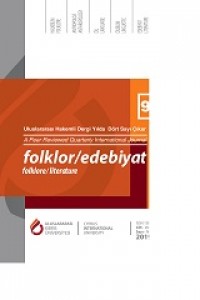Öz
Tragedy has been studied and reworked by theorists from ancient Greece through
Renaissance and into the modern age. Hans Thies Lehmann examines task of
tragedy in his last work Tragedy and Dramatic Theatre (2016). In his detailed
study, Lehmann classifies periods of tragedy such as predramatic, pure dramatic and
postdramatic. In the beginning of twenty first century dramatic and postdramatic
tragedies have been placed with the plays of Sarah Kane, Mark Ravenhill, and
Simon Stephens. Simon Stephens’s play Motortown (2006), written over four
days, represents signs of dramatic and postdramatic tragedies. The play consists
of eight scenes which have structural order with each other; however Simon
Stephens, choosing monologues, deconstructs hierarchical structure and diverges
from the dramatic text. Stage structure of the performance is deconstructed by the
explanation at the beginning of the play: “the play should be performed as far as
possible without decor”. At this point, Motortown puts forth a new approach to
tragedy in dramatic theatre, which conventionally depicts overt physical acts and
suffering on stage, and in postdramatic theatre which unconventionally depicts
overt non-hierarchical structure and irruption of the real. This paper considers how traits of dramatic and postdramatic theatre are determined and how aspects
of dramatic and postdramatic tragedy are experienced in Simon Stephens’s
contemporary performance.
Anahtar Kelimeler
Kaynakça
- Aristotle (1965). The poetics, in classical literary criticism. (trans. P. Murray and T.S. Dorsch). Oxford: Penguin.
- Atkins, J.W.H. (1943). English literary criticism: the medieval phase. Cambridge: University Cambridge.
- Gardner, L. (2006). Review of Motortown, Royal court London stage. The Guardian.
- https://www.theguardian.com/stage/2006/apr/25/theatre. [Accessed 6 February 2018].
- Innes, C. (2011). Simon Stephens. (Eds. Martin Middeke & Peter Paul Schnierer), In The Methuen Drama Guide to Contemporary British playwrights. London: Methuen Drama, 445-465 Jeffery, S. (2003). UK’s biggest peace rally. The Guardian.
- https://www.theguardian.com/uk/2003/feb/15/politics.politicalnews. [Accessed 09 March 2018]. Leech, C. (2002). Tragedy. London: Routledge. Lehmann, H. T. (2006). Postdramatic theatre. London: Routledge.
- Lehmann, H. T. (2016). Tragedy and dramatic theatre. London: Routledge.
- Middeke, M. & Schnierer, P. P. (2011). Guide to contemporary British playwrights. London: Bloomsbury. Munby, K. J. (2006). Introduction. (trans. K. J. Munby) in Postdramatic theatre. London: Routledge.
- Nsdel, C. (2006). Musings on mays and Motortown. In whats on stage. http://www.whatsonstage.com/dl/page.php?page=greenroom&story=E8821145961557. [Accessed 18 January 2018].
- Reilly, J. H. (1994). An introduction to theatre. USA: Burgess International Group. Rosezweig, F. (2005). The star of redemption. (trans. B. E. Galli). Madison: University of Wisconsin.
- Sayın, G. (2016). Simon Stephens tiyatrosu: Dramatik metinden performans metnine. (Ed. D. Bozer), in Postdramatik tiyatro ve İngiliz tiyatrosu. İstanbul: Mitos Boyut.
- Sierz, A. (2011). Rewriting the Nation. British Theatre Today. London: Methuen Drama.
- Sierz, A. (2017). Dark times: British theatre after brexit. PAJ: A Journal of Performance and Art. XXXIX (1): 3-11.
- Spencer, C. (2006). The horror of war comes home. The Telegraph. http://www.telegraph.co.uk/ [Accessed 14 March 2018].
- Stephens, S. (2006). I wrote Motortown in four days. Royal Theatre website. http://www.royalcourttheatre.com/archive_article_detail.asp. [Accessed 15 March 2018].
- Stephens, S. (2009). Introduction. Plays: 2. One Minute. Country Music. Motortown. Pornography. Sea Wall. London: Methuen Drama.
- Szondi, P. (1987). Theory of modern drama. (trans. M. Hays), Minneapolis: University of Minnesota.
- Szondi, P. (2002). An Essay on tragic. (trans.P. Fleming), Stanford: Stanford University. Taylor, P. (2006). Motortown, Royal Court, London. Independent.
- http://www.independent.co.uk/artsentertainment/theatredance/reviews/motortown-royal-courtlondon- 6102553.html. [Accessed 25 December 2017].
- Waal de, A. (2017). Theatre on terror: subject positions in british drama. Boston, MA: De Gruyter.
Ayrıntılar
| Birincil Dil | İngilizce |
|---|---|
| Konular | Sanat ve Edebiyat |
| Bölüm | Derleme Makaleleri -Compilation Articles |
| Yazarlar | |
| Yayımlanma Tarihi | 1 Ağustos 2019 |
| Yayımlandığı Sayı | Yıl 2019 Cilt: 25 Sayı: 99 |
Derginin yayım dili Türkçe ve İngilizce’dir, ayrıca Türkçe de olsa tüm basılan makalelerin başlık, öz ve anahtar sözcükleri İngilizce olarak da makalede bulunur. Hakemlerden onay almış Türkçe makaleler için 750-1000 sözcükten oluşan genişletilmiş özet (extended summary) gereklidir. Elektronik çeviriler kabul edilmez.
Dergi TR-Dizin, Web of Science (ESCI), DOAJ ile diğer pek çok dizin tarafından taranmaktadır. Scimagoe quartile değeri: Q2 'dir:
TR DIZIN 2020 Etik Kriterleri kapsamında, dergimize 2020 yılından itibaren etik kurul izni gerektiren çalışmalar için makalenin yöntem bölümünde ilgili Etik Kurul Onayı ile ilgili bilgilere (kurul-tarih-sayı) yer verilmesi gerekecektir. Bu nedenle dergimize makale gönderecek olan yazarlarımızın ilgili kriteri göz önünde bulundurarak makalelerini düzenlemeleri önemle rica olunur.
Alan Editörleri/ Field Editörs
Halkbilimi/Folklore
Prof.Dr. Hande Birkalan-Gedik (JohannWolfgang-Goethe İniversitet-birkalan-gedik@m.uni-frankfurt.de)
Prof.Dr. Ali Yakıcı (Gazi Üniversitesi-yakici@gazi.edu.tr)
Prof.Dr. Aynur Koçak (Yıldız Teknik Üniversitesi-nurkocak@yildiz.edu.tr)
Prof.Dr. Işıl Altun ( (Regensburg Üniversitesi/Kocaeli Üniversitesi-İsil.Altun@zsk.uni-regensburg.de)
Edebiyat/Literature
Prof.Dr. Abdullah Uçman (Mimar Sinan Güzel Sanatlar Üniversitesi -emekli-29 MayısÜniversitesi-abdullahucman@29mayis.edu.tr
Prof. Dr. Ramazan Korkmaz (Ardahan Üniversitesi-emekli-Kafkasya Üniversiteler Birliği -KÜNİB-r_korkmaz@hotmail.com)
Prof.Dr. Emel Kefeli (Marmara Üniversitesi-emekli-İstanbul 29 Mayıs Üniversitesi-ayseemelkefeli @gmail.com)
Prof.Dr. Zekiye Antakyalıoğlu ( İstanbul Aydın Üniversitesi-zekabe@hotmail.com)
Antropoloji/Anthropology
Prof.Dr. Hanife Aliefendioğlu (Doğu Akdeniz Üniversitesi-hanife.aliefendioglu@emu.edu.tr)
Prof. Dr. Şebnem Pala Güzel (Başkent Üniversitesi-sebnempa@baskent.edu.tr)
Prof.Dr. Derya Atamtürk Duyar (İstanbul Üniversitesi-datamturk@istanbul.edu.tr)
Prof.Dr. Meryem Bulut (Ankara Üniversitesi-meryem.bulut@gmail.com)
Dil-Dilbilim/Language-Linguistics
Prof.Dr. Nurettin Demir (Hacettepe Üniversitesi-demir@hacettepe.edu.tr)
Prof. Dr. Aysu Erden (Maltepe Üniversitesi-aysuerden777@gmail.com)
Prof.Dr. Sema Aslan Demir (Hacettepe Üniversitesi-semaaslan@hacettepe.edu.tr)


